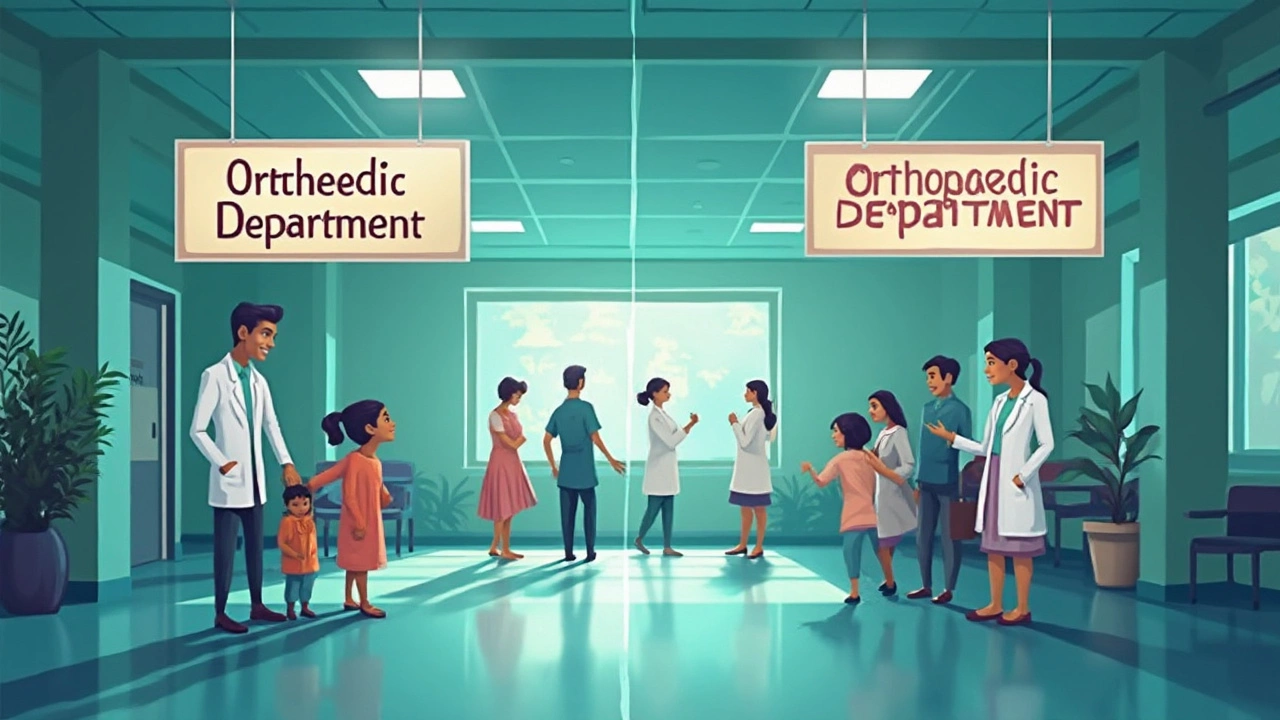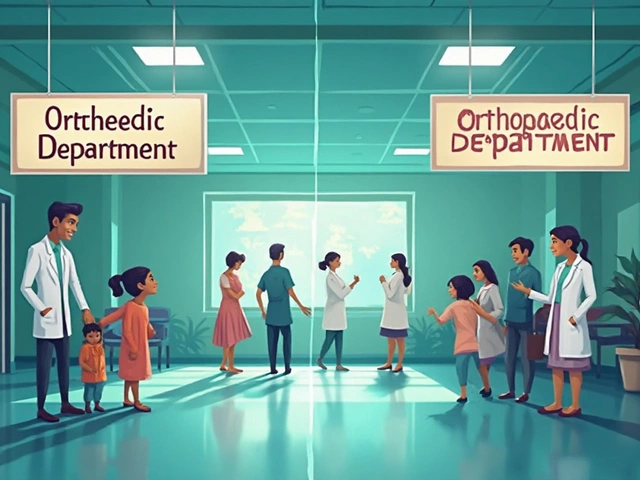- Home
- Orthopedics
- Orthopedic vs Orthopaedic: What’s the Real Difference?

Orthopedic vs Orthopaedic: What’s the Real Difference?
You’ve probably seen both 'orthopedic' and 'orthopaedic,' especially when searching for the right hospital. Is there a secret difference? Nope. The only real difference is the way they’re spelled.
Here’s the quick fix: 'Orthopedic' is how folks in the U.S. usually spell it. Want to sound British or like a hospital in Australia? Use 'orthopaedic' with the extra 'a.' That’s really the whole trick—just American English versus British English. The meaning doesn’t change. Both words point to the same specialty: the branch of medicine that fixes bones, joints, ligaments, and muscles.
Getting confused by fancy-looking letters on hospital signs or websites? Ignore them. If you’re hunting for a hospital or looking up a doctor, don’t sweat the spelling drama. They’re both 100% correct, whether you need a knee replacement or a consult for your kid’s broken wrist.
- The Story Behind the Spelling
- Orthopedic or Orthopaedic: Does It Matter?
- Where You’ll Spot Each Spelling
- Tips for Patients Visiting an Orthopedic Hospital
The Story Behind the Spelling
This is one of those weird things in medicine where history gets in the way of simplicity. The word itself comes from the Greek "orthos" (meaning straight) and "paideia" (meaning rearing children). Jean-André Venel, a Swiss doctor, used the word 'orthopaedia' in the 1700s when he set up the first hospital just for kids with spine and limb problems. Back then, the long, fancy spelling was the only way anyone wrote it.
Fast forward: in the early 20th century, Americans got tired of extra vowels. The U.S. medical community just shaved it down to 'orthopedic.' British English and countries that follow it—like India, Canada, and Australia—stuck with the classic version: 'orthopaedic.' It’s a classic trans-Atlantic spelling face-off, just like 'color' vs. 'colour' or 'anemia' vs. 'anaemia.' Nothing about the treatments or the kind of care changed—just how the word appears on diplomas or on hospital walls.
Want some hard numbers? Here’s a quick look at how these spellings show up in big-name websites:
| Country | 'Orthopedic' Usage (%) | 'Orthopaedic' Usage (%) |
|---|---|---|
| United States | 95 | 5 |
| United Kingdom | 10 | 90 |
| Australia | 20 | 80 |
| India | 25 | 75 |
Here’s the bottom line: If you’re searching hospital websites or filling out paperwork, just match the spelling to where you are. In the U.S., you’ll see and hear orthopedic almost everywhere. If you’re outside the States, expect to bump into the fancy 'a.' But no matter how it’s spelled, you’re dealing with bone, joint, and muscle experts.
Orthopedic or Orthopaedic: Does It Matter?
Let’s clear this up: there’s no difference in meaning between these spellings. Both words describe the same medical specialty. The only real reason for the two versions is where the word is being used. Americans usually go with orthopedic, while hospitals and doctors in the UK, Australia, and a few other places use "orthopaedic." So, it’s just about which side of the ocean you’re on—not a deeper medical idea or new treatment.
You might wonder, are there any official rules? Not really, but the usage is super consistent in each country. In fact, some big U.S. hospitals like the American Academy of Orthopaedic Surgeons (AAOS) keep the "a" in their names mostly for tradition—though they’ll say "orthopedic" everywhere else.
Check out this quick look at spelling trends across major English-speaking countries:
| Country | Common Spelling | Hospitals |
|---|---|---|
| USA | Orthopedic | Hospital for Special Surgery (NY), Mayo Clinic |
| UK | Orthopaedic | Royal National Orthopaedic Hospital |
| Australia | Orthopaedic | Epworth Orthopaedic Centre (Melbourne) |
| India | Orthopaedic | AIIMS Orthopaedic Department |
Does it affect patient care, insurance, or prescriptions? Not at all. Whether the hospital says "orthopedic" or "orthopaedic" on its letterhead, you’ll get the same treatment, surgery advice, and follow-up. Insurance forms don’t mind either spelling. Search engines are smart enough now that both terms will show you the same results. So, if you see a job opening for an "Orthopaedic Surgeon" in London or an “Orthopedic Nurse” in Texas, there’s zero difference in their training or skills.
If you’re writing an email or looking up info, just match the spelling you see on the hospital’s page or use whatever’s common in your region. That’ll keep things simple and clear.

Where You’ll Spot Each Spelling
So you're searching for a specialist or hospital, and you keep running into both spellings. Where does each one show up, and why? Here’s what you’ll actually see in the real world.
In the United States, almost every hospital, clinic, or doctor's office uses orthopedic. Scroll through hospital websites like the Mayo Clinic, Cleveland Clinic, or Hospital for Special Surgery in New York—it's always 'orthopedic.' Insurance paperwork, medical journals, and even most Google search results in the U.S. go with the shorter version.
Flip to the other side of the Atlantic, and it’s a different story. In the UK, Canada, Australia, and India, “orthopaedic” is the chosen spelling. You’ll see it on the websites for the British Orthopaedic Association, the Royal Orthopaedic Hospital in Birmingham, and most government health info in these countries. Some doctors even add “FRCS (Orth)” or “FRCS (Orthopaed)” after their names to stick with the classic style.
It can get a bit mixed up, especially with big brands that want to sound international. Some American-based companies and hospitals use the UK spelling just to look fancy or keep a tradition alive (like the American Academy of Orthopaedic Surgeons).
If you’d rather see the data, check out this table:
| Country | Common Spelling | Example |
|---|---|---|
| USA | Orthopedic | Johns Hopkins Orthopedic Surgery |
| UK | Orthopaedic | Royal Orthopaedic Hospital |
| Australia | Orthopaedic | Australian Orthopaedic Association |
| Canada | Orthopaedic | Canadian Orthopaedic Foundation |
If you’re looking up clinics or searching online, always use the spelling that matches your country. You’ll get more accurate search results and find nearby hospitals faster.
Tips for Patients Visiting an Orthopedic Hospital
If you’re headed to an orthopedic hospital for the first time, the process might feel overwhelming. Relax—it’s pretty straightforward if you know what to expect and how to prepare. Hospitals want things to run smoothly for both you and the doctors, so getting a few things right will make a difference.
- Bring the Right Documents: Always carry your ID, insurance paperwork, a referral if your insurance or doctor requires one, and a list of your medications and allergies. If you’ve had X-rays, MRIs, or other scans done somewhere else, grab those reports or, even better, bring the actual images on a CD or USB stick.
- Wear Practical Clothes: The staff might ask you to move around or check how your joints work. Wearing loose-fitting clothes makes this way less awkward.
- Make a List of Your Questions: It’s easy to forget what you wanted to ask once you’re in the exam room, especially if there’s pain or nerves kicking in. Simple questions like “What is the expected recovery time?” or “Do I have options besides surgery?” help you remember what matters most.
- Ask About Next Steps: Before you leave, make sure you understand what’s coming next—further tests, physical therapy, a follow-up appointment, or even surgery. Don’t leave the office confused.
Orthopedic hospitals see a lot of common injuries and problems. Here’s some handy data:
| Condition | % of Orthopedic Visits |
|---|---|
| Back/neck pain | 27% |
| Knee issues | 21% |
| Fractures (broken bones) | 15% |
| Shoulder injuries | 10% |
| Other joint problems | 27% |
If you’re booking surgery, find out what kind of anesthesia they use, if an overnight stay is needed, and how long you’ll be on crutches or doing rehab. Good hospitals will walk you through all this, but it’s always smart to ask if you’re not sure.
One more thing: don’t ignore pre-visit instructions. If the hospital says not to eat after midnight or to bring running shoes for a walking test, just do it. It keeps your visit on track and safe for everyone.

Arnav Singh
I am a health expert with a focus on medicine-related topics in India. My work involves researching and writing articles that aim to inform and educate readers about health and wellness practices. I enjoy exploring the intersections of traditional and modern medicine and how they impact healthcare in the Indian context. Writing for various health magazines and platforms allows me to share my insights with a wider audience.
About
Medical Resource Center India is a comprehensive online platform dedicated to providing reliable health information and medical resources in India. Explore a wide range of articles, tips, and advice on medicine, healthcare services, and wellness. Stay informed about the latest developments in Indian medicine and access valuable insights into maintaining a healthy lifestyle. Discover expert guidance and health solutions tailored for every Indian citizen. Your go-to destination for authoritative medical knowledge in India.







